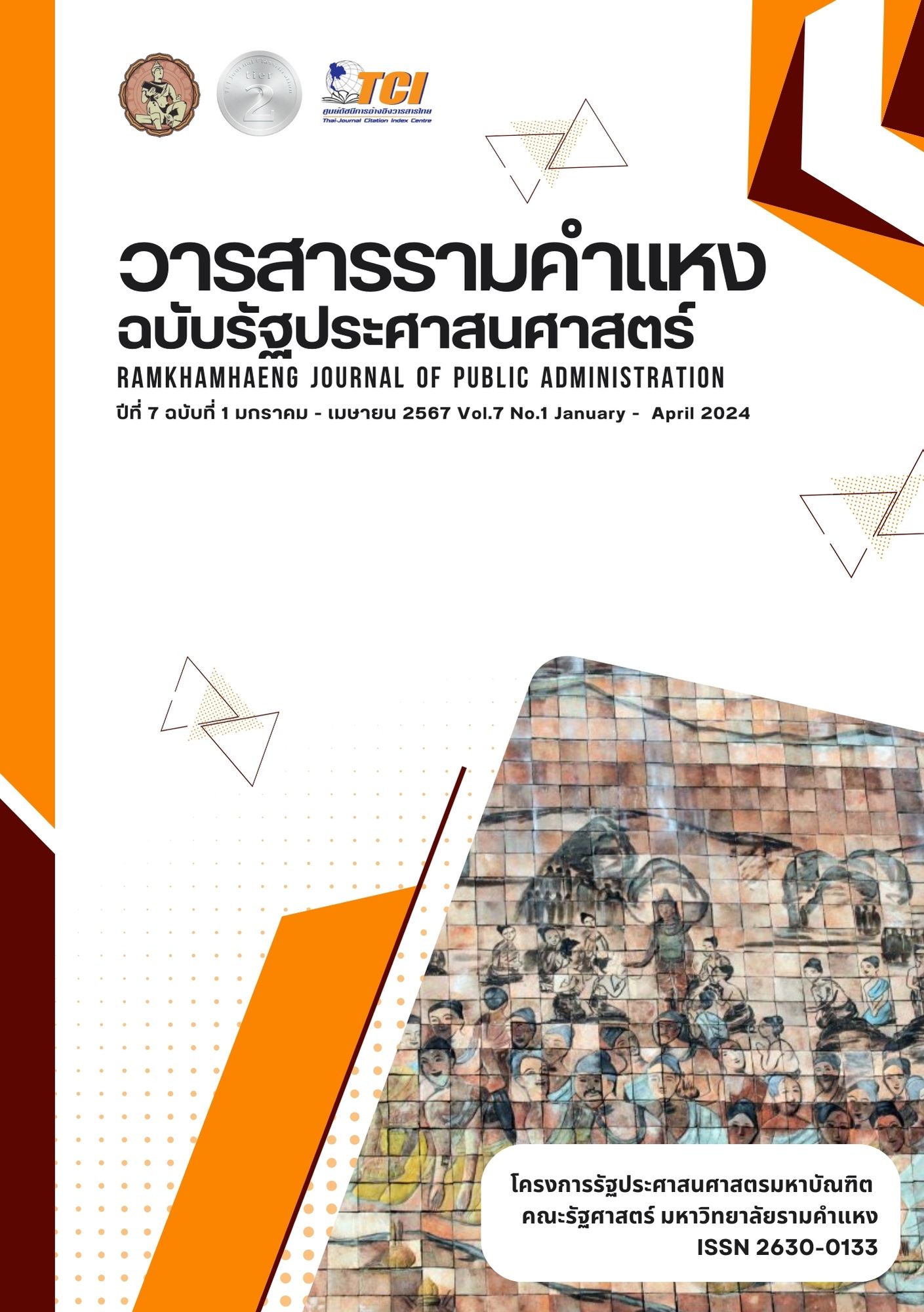Ethical Governance in the Next Decade: Key Attributes for Effective Political Leadership
คำสำคัญ:
honesty, political leadership, public desire, transparency, visionบทคัดย่อ
บทความวิชาการนี้มีวัตถุประสงค์หลักเพื่อค้นหาคุณลักษณะของภาวะผู้นำของนักการเมืองที่ประชาชนปรารถนา โดยเฉพาะอย่างยิ่ง คุณลักษณะของภาวะผู้นำที่ได้รับความนิยมมาอย่างยาวนานในบริบททางวัฒนธรรม สังคม และการเมืองที่แตกต่างกัน เช่น ความซื่อสัตย์ ความโปร่งใส ประสบการณ์ วิสัยทัศน์ ทักษะการสื่อสาร ความเห็นอกเห็นใจ และการประพฤติตนอย่างมีคุณธรรมจริยธรรม โดยบทความนี้เป็นการสังเคราะห์ผลการวิจัยจากบริบทที่หลากหลาย ผลการศึกษา ค้นพบว่า คุณลักษณะที่สำคัญของภาวะผู้นำของนักการเมืองที่ประชาชนต้องการประกอบด้วย ความซื่อสัตย์สุจริต ความโปร่งใส ความรับผิดชอบ ประสบการณ์ความรู้ วิสัยทัศน์ กลยุทธ์ ความเห็นอกเห็นใจ ความเมตตา และการประพฤติตนอย่างมีจริยธรรม ผลการศึกษาในครั้งนี้จึงมีบทบาทสำคัญอย่างยิ่งในการนำไปเป็นแนวทางในการประยุกต์ใช้เพื่อในกระบวนการฝึกอบรมภาวะผู้นำทางการเมือง กระบวนการคัดเลือกผู้สมัครของพรรคการเมือง มาตรการด้านการสร้างความรับผิดชอบ และการตัดสินทางการเมือง ซึ่งในที่สุดแล้วจะส่งผลให้การปกครองมีธรรมาภิบาลและโปร่งใส นอกจากนี้ ผลการวิเคราะห์ยังมีส่วนช่วยในการนำเสนอกรอบการทำงานแบบบูรณาการและสร้างแรงจูงใจในการทำวิจัยเพิ่มเติมเพื่อสนับสนุนความเข้าใจผลกระทบของภาวะผู้นำของนักการเมือง การรับรู้ของสาธารณะ และประสิทธิภาพโดยรวมของผู้นำ แม้ว่าคุณสมบัติที่กล่าวมาข้างต้นจะได้รับการยอมรับว่าเป็นที่ต้องการจากประชาชน แต่การวิจัยเชิงประจักษ์เพิ่มเติมก็มีความสำคัญต่อการประเมินวิธีการปลูกฝังคุณสมบัติเหล่านี้ในแต่ละบริบทของสังคมและวัฒนธรรม
เอกสารอ้างอิง
Bandura, A. (2016). Moral disengagement: How people do harm and live with themselves. Worth Publishers.
Bennister, M., & 't Hart, P. (2015a). Political leadership: A pragmatic institutionalist approach. Political Studies, 63(3), 719-735.
Bennister, M., & 't Hart, P. (2015b). Studying political leadership: Foundations and contending accounts. Palgrave Macmillan.
Besley, T. (2019). Political selection, values, and the voter. Journal of Economic Perspectives, 33(3), 115-134.
Boin, A., 't Hart, P., Stern, E., & Sundelius, B. (2017). The politics of crisis management: Public leadership under pressure. Cambridge University Press.
Bovens, M. (2017). Analysing and assessing accountability: A conceptual framework. European Law Journal, 13(4), 447-468.
Burns, J. M. (2018). Leadership. Open Road Media.
Cialdini, R. B. (2016). Pre-suasion: A revolutionary way to influence and persuade. Simon & Schuster.
Cross, R., & Peake, J. (2022). Presidential leadership and African Americans: "Going public" on behalf of minority rights. Political Research Quarterly, 68(2), 287-299.
Druckman, D. (2013). Negotiations and conflict resolution: A theoretical perspective. In The Oxford Handbook of Political Psychology.
Evans, G. (2016). Leadership in public organizations: An introduction. Routledge.
Fischer, F., Miller, G. J., & Sidney, M. S. (Eds.). (2015). Handbook of public policy analysis: Theory, politics, and methods. CRC Press.
Grimmelikhuijsen, S., Porumbescu, G., Hong, B., & Im, T. (2022). The effect of transparency on trust in government: A cross-national comparative experiment. Public Administration Review, 82(1), 126-135.
Hickman, G. R. (2014). Leading organizations: Perspectives for a new era. Sage Publications.
Hudson, V. M. (2017). The history and evolution of foreign policy analysis. Oxford University Press.
Jackson, B., & Parry, K. (2019). A very short, fairly interesting and reasonably cheap book about studying leadership. Sage Publications.
Kingdon, J. W. (2014). Agendas, alternatives, and public policies (Vol. 45). Pearson Higher Ed.
Kissinger, H.A., Schmidt, E., & Huttenlocher, D. (2021). The age of AI: And our human future. Little, Brown and Company.
Lawton, A., et al. (2023). Ethics in public policy and management: A global research companion. Routledge.
Malone, H., & Ntziadima, A. (2022). Learning from crisis: The experience of the London Olympics. Journal of Contingencies and Crisis Management, 20(4), 230-241.
Mansbridge, J. (2018). In a system of representative government, who should represent? Daedalus, 147(2), 15-32.
Marcus, G. E. (2019). The sentimentalist theory of democracy. Cambridge University Press.
McAdam, D. (2019). Political process and the development of Black insurgency, 1930-1970. University of Chicago Press.
Moynihan, D. P. (2019). Who's to blame? Attribution of responsibility in crisis response. The Oxford Handbook of Public Accountability.
Mintrom, M. (2020). Policy entrepreneurs and dynamic change. Cambridge University Press.
Moore, C. (2020). Moral disengagement. Current Opinion in Psychology, 6, 199-204.
Nye, J.S. (2021). Do morals matter? Presidents and foreign policy from FDR to Trump. Oxford University Press.
Patterson, T. E. (2014). Informing the news: The need for knowledge-based journalism. Vintage.
Rhode, D. L. (2021). Women and leadership. Oxford University Press.
Rudolph, T. J., & Evans, J. (2017). Political trust, ideology, and public support for government spending. American Journal of Political Science, 61(3), 574-589.
Schillemans, T. (2018). Accountability in the shadow of information? Utrecht University.
Schwab, K. (2017). The fourth industrial revolution. Crown Business.
Simons, T. (2014). Behavioral integrity: The perceived alignment between managers' words and deeds as a research focus. Organization Science, 13(1), 18-35.
Stoker, G., & Rawlings, M. (2021). The digitization of public participation: An investigation into the use of social media in local government. Governance, 34(2), 321-336.
ดาวน์โหลด
เผยแพร่แล้ว
รูปแบบการอ้างอิง
สัญญาอนุญาต
ลิขสิทธิ์ (c) 2024 Waiphot Kulachai, Duangruedee Eaosinsup

อนุญาตภายใต้เงื่อนไข Creative Commons Attribution-NonCommercial-NoDerivatives 4.0 International License.



